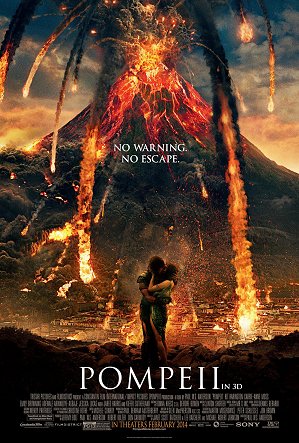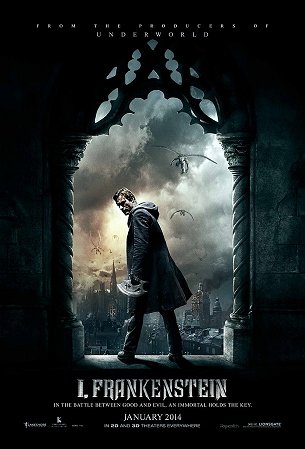

CGI Heaven &Hell:
Pompeii and I, Frankenstein
Ah, my grappling with modern technology continues. I refuse to see a new movie in 3D, for example. Any new movie. I’ve tried it twice now (Avatar and Alice in Wonderland, since you ask) and both were just as enjoyable in 2D, so that’s that. CGI or Computer Generated Images is turning out to be a lot more problematic. The two films that I’m going to have a quick look at here are perfect examples of what’s good and what’s bad about the technique. And since I hate being negative about movies let’s get the appalling I, Frankenstein (directed by Stuart Beattie and written by a whole company) out of the way first.
It all started so promisingly. In fact, I experienced the growing of a little wood on hearing the title as I thought I was about to see an adaptation of an old Brian Aldiss novel that I’d read in the dim and distant past (1973, actually). Now, Aldiss is out-of-print these days as far as I know, but in the 60s he would have been very influential, working alongside Michael Moorcock and J. G. Ballard, in changing people’s perceptions of what science-fiction could be. He was also the author of three semi-autobiographical and eye-wateringly sexually explicit novels—two of which had the wonderful titles of A Hand Reared Boy and A Soldier Erect— as well as a marvellous history of SF called Trillion Year Spree. This is of interest because as I recall he put forward a very strong case that Mary Shelley was the originator of science-fiction as we know it when she published in 1818—at the tender age of eighteen—Frankenstein, or The Modern Prometheus.
He deepened his theory when he wrote the novel I was thinking about, in which a guy goes into the past and falls in love with Mary. I found this idea of a living author having a thing for a woman dead a century and a half wonderfully romantic and creepy in equal measures. Necromantic, perhaps?
So there I was, sitting waiting to see what the movies were going to make of this. Actor Aaron Eckhat was in the credits, so that was good. Then the film actually started.
Does anyone out there read the hilarious Daily Star strip cartoon about the hapless Foreign Legionnaire, Beau Peep? If you do, then you may recall one week in which Beau was put in charge of the soccer team. There he is, watching and sweating on the sideline:
“This is good. We’re holding them well. Nil-nil. If it stays like this I’ll be happy. OH NO! THEY’VE KICKED OFF!”
Well, this was a bit like that. I was a happy little camper, waiting for the company logos to finish and then DISASTER as the actual movie started and I realised with horror in the first two minutes that I was watching a steaming pile of horse shit that had nothing to do with Aldiss’s novel. In fact, to my shame I had misremembered the title: it was Frankenstein Unbound I had been thinking of! I’m going to have to hand in my Anal Retentive Nerd Membership Card.
Which wouldn’t matter if the film had been any good, but it wasn’t—not even one frame of it. We are rushed through a three-minute potted version of the events leading from the creature’s creation to his self-exile in the Arctic wastes and then—get this—he is kicking the CGI asses of gargoyles and demons which explode in Buffy-type special effects and I’m thinking that my own head is going to do the same. And then we’re rushed through at breakneck speed—everything about this thing is designed to give you motion-sickness—an ‘explanation’ of how there is an age-old war between two separate species that are hidden from humankind. And just as you’re wondering if you’re watching Underworld by accident in comes Bill Nighy with the same kind of name that he had in those movies, Naberius or something and it’s all gone very, very wrong. We rush in about five seconds flat from the nineteenth century to a 21st one that I don’t really recognise at all and…
I was suddenly back in Abraham Lincoln Vampire Hunter territory and let me tell you, I still don’t know how Daniel Day-Lewis won an Oscar for that.
Awful, just awful. No soul (unintentionally ironic, I’m sure), no heart, no characters worth giving a toss about. Just CGI and tons of it as if that will make up for a lack of passion or cohesion.
What was Eckhart thinking of in taking this part? Did he just like wearing the Harvey Dent/Two-Face make-up so much that he was having withdrawal symptoms? Because that’s what it looks like. He looks in fact a bit like Robert De Niro in that other turkey, Mary Shelley’s Frankenstein. Or was he missing doing super heroes, because mind-bogglingly enough that’s what the Frankenstein Monster turns into here, a frigging super hero, fighting the bad guys and in search of a franchise that ain’t gonna happen, baby.
And this is the kind of CGI movie that reminds you of how much you love stop-motion or even animatronics effects. There’s no warmth, no damned cuddliness…and I’ll say it again: there’s no heart.
Then Again, on the Other Hand…
Yes, on the other hand we have a film that really couldn’t have been made without CGI effects. And yet I loved it!
I’m aware that this puts me in a very small minority but seriously folks, what is it with all the hate being directed against Paul W. S. Anderson’s Pompeii? I’ve heard nothing but bad things about it and yes, there is a basis for some complaints but let me tell you, watching this on a rainy Sunday afternoon is as close to a return to ye old matinee heaven as I’ve been in many a long year. Despite some pretty graphic violence at the beginning and in the arena there is just something very old-fashioned about this film. It is written by Janet Scott Batchler, Lee Batchler and Michael Robert Johnson and yes, it does have that kind of feel that it was put together by a committee. But hell, wasn’t that true of what we now consider old black & white classics? You know all that French stuff about the auteur theory as applied to Howard Hawks movies? Forget it, load of rubbish. This is how they always made movies.
Pompeii opens with the ash-covered figures of men and women long dead and the accompanying quote from the historian Pliny the Younger who witnessed the destruction from afar:
“You could hear the shrieks of women, the wailing of infants, and the shouting of men; some were calling their parents, others their children or their wives, trying to recognise them by their voices. People bewailed their own fate or that of their relatives, and there were some who prayed for death in their terror of dying. Many besought the aid of the gods, but still more imagined there were no gods left, and that the universe was plunged into eternal darkness for evermore.”
Now, in the week that we have been reading those harrowing accounts from survivors of the D-Day Landings (‘I heard men in the water calling for their mothers’), that is pretty moving stuff. And of course Pompeii is an entertainment first and foremost, so there is nothing as hard-hitting in the film itself. But it is good; and I would hazard a guess that had you never heard of Titanic or Gladiator you would think it a grand movie indeed. But of course it shamelessly tries to rip off both of these and in the trying reminds you of just how special Gladiator really is. My God, look at the cast that film had: Russell Crowe, Joaquin Phoenix, Richard Harris and Oliver Reed alone would have made it memorable; but then you add a wonderfully resonant echoing of events down through the centuries as well as a compelling storyline and no, of course Pompeii isn’t in the same league. Nor does it have a lead couple that clicked with an audience in the manner that Leonard de Caprio and Kate Winslet did in Titanic; but for all that, yes– it is enjoyable.
Lead actor Kit Harrington learns that he’s lucky Jon Snow came along because he’s a bit of a charisma-free zone where a personality should be. The sole survivor of a horse-tribe who were slaughtered by the Romans, he is known in gladiator school only as ‘The Celt’. Unfortunately he makes the mistake of sharing his real name with us and that’s Milo. I say ‘unfortunately’ in deference to any Milo who might be reading this, but after that I kept thinking of an ancient comedy show called Me Mammy and that’s all I’m going to say about that.
Although he’s poor but honest (and of course a gladiator) he falls for Cassia who falls right back. Now I’m sure that Emily Browning is a sweet and lovely young girl but unfortunately for her as leading lady, she shares too much screen time with Jessica Lucas, who is playing a friend or servant, I’m not sure which. What I am sure of is that she’s a better actress and even if she weren’t, my eyes spent so much time on her cleavage that Cassia didn’t really register with me. Shallow person that I am, I find it hard to empathise with someone when I’m staring at their friends’ boobs, a little slaver hanging from my lower lip. Anyway, you can see the problem: as star-crossed lovers, Leo and Kate they’re not. And then there’s Kiefer Sutherland. Jesus, what is that accent he’s doing; and that weird thing with his mouth? Strange isn’t the word. Still, he’s having a great old time as the bad guy with no shades of gray whatsoever.
In the end, though, it’s about the big volcano exploding, isn’t it? And this is where the CGI comes in. In fact it has been used to great effect throughout in flyovers of Pompeii itself and the truth is that the city is more real than any of the characters. I won’t say that when it goes it is as affecting as the sinking of the ‘Titanic’, but it is definitely more emotional than the deaths of any of the characters. It is incredibly realistic, and for the first time I wished that I was watching something in 3D. The tsunami sweeping through the streets, carrying ships in its wake is simply breathtaking, as are the fireballs erupting from the volcano opening and thudding into the sea. I don’t know how any smart-ass critic can watch this astonishing recreation of the awesome power of Nature and Humanity’s helplessness before it and think that a smart quip will sum it up. It won’t. In the last twenty minutes, this is brilliant film-making and the truth is that Pompeii simply doesn’t deserve the utter trashing it has received because even in the lead up to that it is never less than entertaining.
And it really couldn’t have been done without CGI effects.
Finally, unlike I, Frankenstein it obviously wasn’t cynically aiming to start a film franchise. Which reminds me of a funny comment that I saw on the web from a guy wondering how he missed the first film; but still, he did enjoy Pompe II.
Well, I thought it was funny.
And incidentally, Frankenstein Unbound did in fact make it onto the big screen and was directed by Roger Corman, coming out of retirement after 20 years. No, I’ve no idea how it turned out and frankly I don’t want to hear the name Frankenstein for a long time now.


Recent Comments